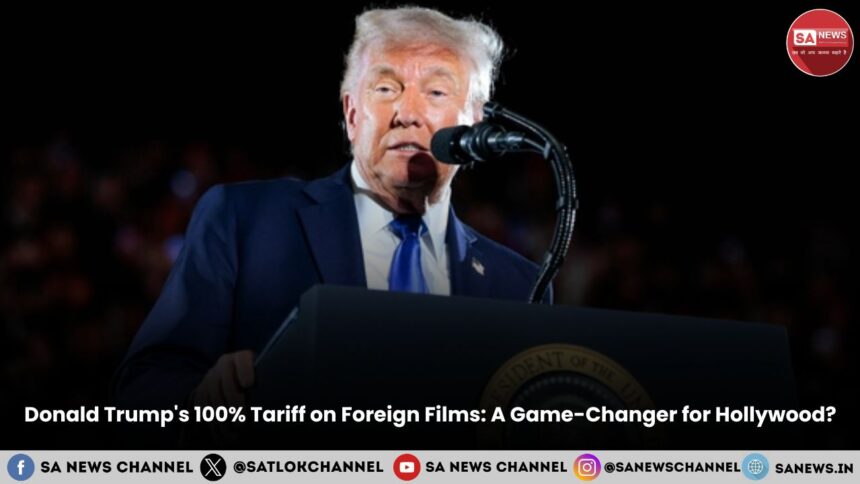Donald Trump has once again grabbed global headlines—this time with a bold move targeting the movie industry. The former U.S. President has proposed a 100% tariff on foreign-produced films, claiming it’s essential to protect national security and revive the American film industry. According to Trump, foreign countries are offering huge incentives to lure U.S. filmmakers, leading to a decline in domestic film production. His decision has sparked heated debates within Hollywood and the global film community.
The Reason Behind the Tariff
Trump’s administration argues that foreign-made films may carry “messaging and propaganda” that could influence American values and public opinion. But the concern goes beyond messaging—Trump says other nations are strategically undercutting the U.S. film industry by giving tax breaks and funding support to filmmakers.
These incentives make it cheaper to produce blockbuster films abroad. As a result, U.S. studios increasingly shoot in Canada, New Zealand, the UK, and Eastern Europe to save costs. Trump sees this as a direct threat to American jobs in acting, production, visual effects, and even local tourism.
The 100% tariff is being marketed as a tool to:
- Bring back American film jobs
- Encourage Hollywood to shoot domestically
- Reduce reliance on foreign production services
Potential Impact on Hollywood
This proposed tariff could have wide-ranging effects on both the American and international film industries.
Higher Ticket Prices
If foreign-made films become more expensive to import, studios may pass that cost on to moviegoers. This could lead to:
- Increased ticket prices, especially for global hits
- Reduced accessibility for lower-income audiences
- A potential decline in theater attendance
Popular international films like Parasite, RRR, or Dune: Part Two could cost more to watch in the U.S., leading viewers to rethink their movie plans.
Disruptions in Production
Many major Hollywood films depend on international locations and foreign crews. Movies such as:
- Avengers: Doomsday
- Avatar 3
- The Batman II
…often shoot across multiple countries for visual variety and budget efficiency. The tariff could force studios to:
- Rethink location choices
- Face budget overruns
- Delay or even cancel shoots
This would disrupt production timelines, affect global talent collaborations, and limit creative freedom.
Global Film Budgets
Studios operate on tight margins and carefully crafted budgets. The extra expense of tariffs could result in:
- Fewer international co-productions
- A shift toward domestic-only films
- Job losses in countries that regularly collaborate with Hollywood
Moreover, indie filmmakers and smaller studios that rely on cross-border partnerships might struggle to survive under this policy.
Challenges in Implementation
While the idea may sound patriotic to some, putting it into action is far more complicated. Today’s film industry is deeply globalized. For example:
- A movie might be written in L.A., shot in Italy, edited in Canada, and scored in Germany.
- Visual effects are often outsourced to companies in India, South Korea, or Australia.
This makes it hard to define what exactly counts as a “foreign film.” Would a 10% foreign component trigger the tariff? Or does it apply only to fully foreign-made films?
There’s also confusion over how tariffs will be collected and who bears the final cost—the studio or the distributor? As of now, the Motion Picture Association has not released a statement, leaving filmmakers in a cloud of uncertainty.
Industry Reactions
Reactions from the industry have been mixed.
Supporters argue:
- It’s time to put America first in entertainment.
- This will create more jobs for American workers.
- Hollywood has become too dependent on foreign subsidies.
Critics warn:
- The move could isolate Hollywood from the global market.
- U.S. films could face retaliatory tariffs abroad.
- International talents might avoid collaborating with American studios.
Some also fear that this is a political distraction—a symbolic move that could damage the U.S.’s cultural influence worldwide.
Conclusion
Trump’s complete tariff on international films is a daring and debated effort to change the entertainment industry. While it could encourage more domestic filmmaking and create local jobs, the risks are equally significant—ranging from higher consumer costs to international backlash and production hurdles.
Hollywood now stands at a crossroads. Will it embrace Trump’s vision of national revival or push back in defense of creative and economic freedom?
What do you think?
Will this policy revive American cinema or cripple global collaboration? Only time will tell if this is a blockbuster idea—or a box office flop.









